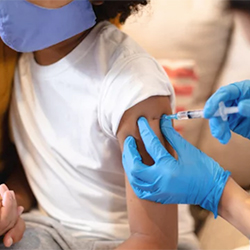By IDSE News Staff
The FDA amended the emergency use authorization (EUA) for the Pfizer-BioNTech COVID-19 vaccine, allowing children aged 5 through 11 years to receive a single 10-mcg booster dose at least five months after the completion of a primary series.

“While it has largely been the case that COVID-19 tends to be less severe in children than adults, the omicron wave has seen more kids getting sick with the disease and being hospitalized, and children may also experience longer term effects, even following initially mild disease,” FDA Commissioner Robert M. Califf, MD, said in a statement.
On Jan. 3, the FDA authorized a single booster dose of the vaccine for people 12 through 15 years of age after completion of primary vaccination.
The expanded EUA is based on data from a phase 2/3 clinical trial of 140 children 5 through 11 years of age who received a third dose approximately six months after a second dose of the primary series, according to the FDA.
The phase 1/2/3 trial initially enrolled up to 4,500 children aged 6 months to under 12 years of age in the United States, Finland, Poland and Spain from more than 90 clinical trial sites. Additional children have been enrolled in all age groups following study amendments, and the trial currently includes more than 10,000 children. The trial was originally designed to evaluate the safety, tolerability and immunogenicity of the Pfizer-BioNTech COVID-19 vaccine on a two-dose schedule (approximately 21 days apart) in three age groups: ages 5 to under 12 years; ages 2 to under 5 years; and ages 6 months to under 2 years. Based on the phase 1 dose-escalation portion of the trial, children aged 5 to under 12 years received a two-dose schedule of 10 mcg each, while children under age 5 received a lower 3-mcg dose for each injection in the phase 2/3 study. The trial enrolled children with or without prior evidence of SARS-CoV-2 infection. In December 2021, Pfizer and BioNTech announced the companies would test a third 3-mcg dose given at least two months after the second dose in children under age 5 and a third dose of the 10-mcg formulation in children aged 5 to under 12 years.
“The 50% neutralizing geometric mean titer [GMT] against omicron was 993 (after three doses), compared with 27 after two doses,” the FDA statement said. “The neutralizing GMT against the wild-type virus was 2,153 (after three doses), compared to 335 after two doses.”
The third dose had a similar safety profile to the two-dose primary series, according to the FDA.
Common side effects included pain, redness and swelling at the injection site, fatigue, headache, muscle or joint pain, and chills and fever.
More than 8 million 5- to 11-year-olds in the United States have completed a primary series, Pfizer said.
The FDA has determined that the known and potential benefits of a single booster dose of the Pfizer-BioNTech COVID-19 vaccine for children 5 through 11 years of age at least five months after completing a primary series outweigh its known and potential risks, and that a booster dose can help provide continued protection against COVID-19 in this and older age groups,” said Peter Marks, MD, PhD, the director of the FDA’s Center for Biologics Evaluation and Research.
The clinical trial evaluating the safety, tolerability and immunogenicity of a 3-mcg formulation of the Pfizer-BioNTech COVID-19 vaccine on a three-dose schedule in children ages 6 months through 4 years (also known as under 5) is ongoing.

